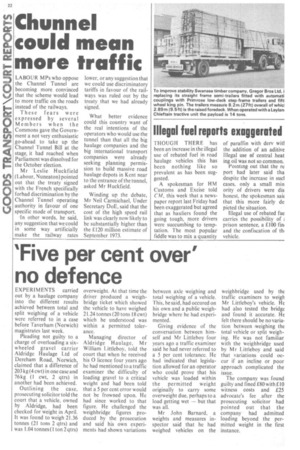'Five per cent over' no defence
Page 24

If you've noticed an error in this article please click here to report it so we can fix it.
EXPERIMENTS carried out by a haulage company into the different results achieved between total and split weighing of a vehicle were referred to in a case before Taverham (Norwich) magistrates last week.
Pleading not guilty to a charge of overloading a sixwheeled gravel carrier Aldridge Haulage Ltd of Dereham Road, Norwich, claimed that a difference of 203 kg (4 cwt) in one case and 76 kg (1 cwt, 2 qtrs) in another had been achieved.
Outlining the case, prosecuting solicitor told the court that a vehicle, owned by Aldridge, had been checked for weight in April. It was found to weigh 21.36 tonnes (21 tons 2 qtrs) and was 1.04 tonnes (1 ton 2 qtrs) overweight. At that time the driver produced a weighbridge ticket which showed the vehicle to have weighed 21.24 tonnes (20 tons 18 cwt) which he understood was within a permitted tolerance.
Managing director of Aldridge Haulage, Mr William Littleboy, told the court that when he received his 0 licence four years ago he had mentioned to a traffic examiner the difficulty of loading gravel to a critical weight and had been told that a 5 per cent error would not be frowned upon. He had since worked to that figure. He challenged the weighbridge figures produced by the prosecution and said his own experiments had shown variations between axle weighing and total weighing of a vehicle. This, he said, had occured on his own and a public weighbridge where he had experimented.
Giving evidence of the conversation between himself and Mr Littleboy four years ago a traffic examiner said he had never referred to a 5 per cent tolerance. He had indicated that legislation allowed for an operator who could prove that his vehicle was loaded within the permitted weight originally to carry some overweight due, perhaps to a load getting wet — but that was all.
Mr John Barnard, a weights and measures inspector said that he had weighed vehicles on the weighbridge used by the traffic examiners to weigt Mr Littleboy's vehicle. He had also tested the bridge and found it accurate. He felt there should be no variation between weighing the total vehicle or split weighing. He was not familiar with the weighbridge used by Mr Littleboy and said that variations could occur if an incline or poor approach complicated the issue.
The company was found guilty and fined £80 with £10 witness costs and £25 advocate's fee after the prosecuting solicitor had pointed out that the company had admitted loading beyond the permitted weight in the first instance.




















































































































